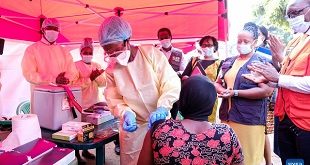
Kampala, Uganda | THE INDEPENDENT | The Rockefeller Foundation has hailed Uganda for being the first to develop the health national adaptation plan to guide them handle effects of climate change.
Speaking to URN in an interview on Thursday just before the launch of the plan, William Asiko the Africa Vice President of the global philanthropy said Uganda set a vital lesson to the world having been able to control the Ebola epidemic in record 90 days and yet the viral hemorrhagic fever has previously brought other economies to their toes.
The new five-year plan which describes what the country needs to do to guard against emergencies and how to mitigate them when they arise is a global requirement for all countries that attended the global climate convention by the United Nations.
According to Dr Diana Atwine, the Permanent Secretary in the Ministry of Health, they have come up with a comprehensive document that covers various components from strengthening the workforce supposed to handle such emergencies as emerging and re-emerging disease, catastrophic events like flooding and mudslides to how coordination between the various government and non governmental organisations should be.
Uganda becomes the second in the world to develop the document and Asiko says while there are global efforts to mitigate the impact of climate change, Africa has so far contributed little to this agenda due to low rates of emission and yet the continent continues to suffer disproportionately from the effects.
The Minister without portfolio Rukia Nakadama who officiated at the launch said this plan being launched after a recent emergency in the Kampala Metropolitan where a heap of rubbish collapsed only shows how urgent it is for governments to come up with coping plans for such events.
She said that apart from mainstreaming climate change for all sector, there is need to create awareness that enables community involvement to keep some calamities away and also be involved actively when incidents arise.
Atwine says such key areas are catered for in the plan and that they did a vulnerability assessment before coming up with this guide. Key areas in health that are handled include mental and psychosocial health, food borne diseases, injury and mortality from extreme weather events among others.
Asiko says such areas have also been Rockefeller’s area of interest over the years.
The organization has previously funded public health research in Uganda and food systems strengthening. More recently he says the organization had to revise it’s strategy to include climate and climate change programming in their work.
******
URN
 The Independent Uganda: You get the Truth we Pay the Price
The Independent Uganda: You get the Truth we Pay the Price


